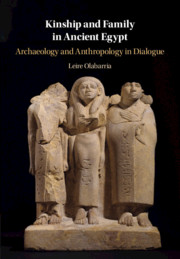Book contents
- Kinship and Family in Ancient Egypt
- Kinship and Family in Ancient Egypt
- Copyright page
- Dedication
- Contents
- Figures
- Acknowledgements
- Map of Egypt
- Part I Ancient Egyptian Kinship in Context
- One Introduction: Ancient Egyptian Kinship between Relatedness and Material Agency
- Two Understanding the Sources
- Three Setting the Terms
- Four Between the Emic and the Etic
- Five Dynamising Kin Groups
- Part II On Koinographic Analysis
- Appendix: ANOC Table
- Notes
- Bibliography
- Index
Three - Setting the Terms
Etic and Emic Approaches to Ancient Egyptian Relatedness
from Part I - Ancient Egyptian Kinship in Context
Published online by Cambridge University Press: 26 February 2020
- Kinship and Family in Ancient Egypt
- Kinship and Family in Ancient Egypt
- Copyright page
- Dedication
- Contents
- Figures
- Acknowledgements
- Map of Egypt
- Part I Ancient Egyptian Kinship in Context
- One Introduction: Ancient Egyptian Kinship between Relatedness and Material Agency
- Two Understanding the Sources
- Three Setting the Terms
- Four Between the Emic and the Etic
- Five Dynamising Kin Groups
- Part II On Koinographic Analysis
- Appendix: ANOC Table
- Notes
- Bibliography
- Index
Summary
Chapter 3 addresses the use of emic and etic categories to study kinship and marriage in ancient Egypt. Family and household are widespread but problematic concepts; the former is an emic term of our own Western culture, and the latter presumes that a group is bounded to a physical space. Kin group is proposed as the preferred analytical category, since it simply refers to a group connected by kinship, which should be understood in very broad terms. The chapter goes on to discuss the most appropriate categories for exploring material culture, outlining the difference between an object cluster (i.e. ANOC group, workshop) and its embodiment of a social group.
Terminology for individual kin types as well as for kin groups in ancient Egypt is explored. A limited terminology of kinship for individuals (basically lineal ascendants, lineal descendants, and collaterals) contrasts with a wealth of terms for kin groups in the primary sources. A productive way to understand kinship terminology may be to focus on what those individuals and groups do rather than on what they are. In this sense, a performative definition is advocated, in line with the theoretical framework of processual kinship.
Keywords
- Type
- Chapter
- Information
- Kinship and Family in Ancient EgyptArchaeology and Anthropology in Dialogue, pp. 57 - 74Publisher: Cambridge University PressPrint publication year: 2020

